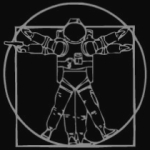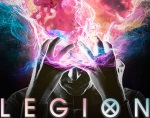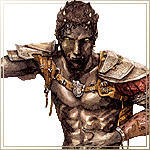CALUNIO'S SURREALIZATIONS ON RMN SUMMER GAMES 2011
About surrealism, the unconscious and the RMN event.
 calunio
calunio- 09/21/2011 02:29 PM
- 16015 views
Sit comfortably on your chair. Grab a cup of hot chocolate. Stretch your limbs, focus your eyes. You’re in for a long read.
The 2011 RMN Summer Games have been unusual in many ways. First, it had one of the longest (if not the longest) development period of all RMN events (one month). Second, it had a very challenging and restrictive theme: Surrealism, which is more than a synonym of “weird”, but an actual artistic style. Third, a very unexpected group of judges, none of which known for their orthodox tastes in games: StarSkipping, the guy who made strange games like Suicide Club 3 and who’s written some very picky reviews; Max McGee, one of the most prolific RMN members with a huge talent for receiving polemic reviews to his games; and myself, someone who’s got the (undeserved) fame of making games that a parent wouldn’t let his children play.
But sometimes change is good, and this is definitely one of those times. We’ve got twelve very solid entries, all of which from people and teams who’ve stepped up to the challenge of creating good surreal games within a time limit. Overall, I’m quite pleased with these games, and I enjoyed playing (almost) all of them.
Let’s start by talking about the theme. I’m no art specialist, but I do know a bit about cultural and psychological theories that inspired this artistic movement, so I’ll take some freedom in discussing this. Surrealism. What is it? Our initial response should be “strange”, “weird”, which is not far from the truth, but it’s not the whole story. Our basic definition (as described in the gamepage) is:
Surrealism: movement that attempts to express the workings of the subconscious and is characterized by fantastic imagery and incongruous juxtaposition of subject matter.
Going a bit further:
“Surrealism was an offshoot of Dadaism, which posited that traditional art should be replaced with anything "anti-art" and triumphed the ridiculous, the absurd, and a basic disregard for form. Andre Breton was the initial proponent of surrealism in literature and the visual arts. Much of his emphasis was on accessing the unconscious, as viewed by Sigmund Freud.” (Wisegeek)
Definitions from the original Surrealist Manifesto, by Andre Breton:
“Dictionary: Surrealism, n. Pure psychic automatism, by which one proposes to express, either verbally, in writing, or by any other manner, the real functioning of thought. Dictation of thought in the absence of all control exercised by reason, outside of all aesthetic and moral preoccupation.
Encyclopedia: Surrealism. Philosophy. Surrealism is based on the belief in the superior reality of certain forms of previously neglected associations, in the omnipotence of dream, in the disinterested play of thought. It tends to ruin once and for all other psychic mechanisms and to substitute itself for them in solving all the principal problems of life.”
Surrealism is a reactionary movement. It opposes to realism (attemtp to accurately reflect reality as faithfully as possible) and rationalism (logical reason as the source of truth). It’s a “shut up, I don’t have to follow any rules” form of art. Surrealism is defined as a denial of a given set of rules and standards.
As an artistic movement that started in the 1920s, modern surrealism has changed since then, as much of our artistic and visual culture has. Not only the contemporary world would appear surreal to the eyes of people almost a century ago, but modern media and virtual realities have trained our eyes to accept as real things that otherwise would be considered surreal.
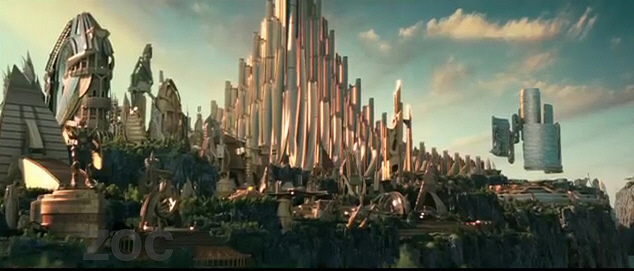
This could very much be considered a surreal painting a bunch of decades ago, but it is an image not unexpected or surprising by someone who turns on his TV or goes to the movie today and watches something that can hardly be considered “weird”, or “original”. One could say that “the surreal has become real”. There’s a relative standard, a cultural point of view from which we can say if a given form is surreal or not. Once the surreal starts setting its own standards, rules and boundaries, it is not surreal anymore.
Those familiar with the worlds of video games have had an even more intense experience in adapting to the surreal. Video games have never been realistic or rational in the first place. Maybe that’s partially why they tend to be so fascinating. Characters in video games are deformed, they can jump incredible heights, change appearance instantly, collect infinite coins with no pocket to hold them in, get significantly stronger from one second to the other, die and come back. I mean, come on... what’s more surreal than Mario? The guy defeats enemies by jumping over their heads, goes from one place to another by traveling in giant interdimensional pipes, and he doubles his size by eating mushrooms. Trippy stuff.

But games set trends, they set standards. New games will follow rules that were set by old games. They won’t come off as unexpected, surprising, or incongruous. They’re not surreal anymore. As distant from reality as they may seem, games tend to follow very strict design rules that were created by a culture of gamers. As amateur game designers, we know those rules, and we have our own. As members of a game design community, we extensively discuss those rules among our peers. What makes a good game? Balancing, a good story, visual consistency, good pacing, nice graphics, etc. etc. We have our rules, our own sort of rationalism. Not only that, games (especially commercial ones) are setting realism as a new golden standard. Cooler games are as realistic as possible. Not only graphically resembling real life, but they have realistic time-passing systems, real-person voices and faces, they force you to eat, sleep... they’re becoming simulations of real-life activities.

Still can’t mistake this for a real person, but we’re getting close.
These rules get so strict, that it’s only natural to expect some sort of reactionary movement in game-design, our own breed of “anti-art”. Thanks to indie game design communities, which are not as tied by commercial standards, we have our own sort of Surrealism in games. These are the games that say “to hell with three-tile mapping, to hell with elaborate custom systems, to hell with standard story structures”. Feels good to be freed from the chains. That’s why games such as Space Funeral get so much attention, even outside the indie community. When something actually breaks the molds, stomps over realism and utterly ignores rationalism, it provokes that sense of awe, surprise and fascination which is characteristic of Surreal art.
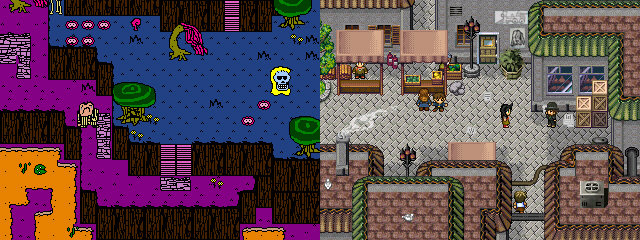
I’m not you.
Space Funeral is not a particularly good game in many ways, but it stands out because it achieved this simple goal, which is breaking free from norms. By definition, it sets its own norm, so it’s pretty clear a Space Funeral clone wouldn’t be as interesting, and it would lose its merits in surrealism. Yes, as you may have noticed, making a surreal game is no easy task.
The Unconscious
One thing about Surrealism is not following any rules or standards. Another thing about it is letting our work of art be guided by the works of our unconscious. Let me share a word about the unconscious, as defined by our friend Sigmund Freud. It is operated by something called “the pleasure principle”, an instance that does not follow any of the rules that define reality: constancy, chronology, coherence, etc. To the pleasure principle, two people can be the same person, you can be at one place and another at the same time, etc. If you ever had a dream, you know what I’m talking about. The pleasure principle is guided by, as you may have guessed, pleasure. It represents the omnipotence of desire. “I want it all, and I want it now”, it goes. Luckily there’s a counterpart to the pleasure principle which is the reality principle, mediated by the ego, that allows us to live in the real world. It forces us to conform to reality, and oppresses the pleasure principle. Without it, we just wouldn’t survive.
That’s why people tend to associate Surrealism with dreams: they follow the same principles (which are none). But the unconscious does not operate solely when we’re sleeping. It is omnipresent, it is in us, behind us, even when (and especially when) we’re not aware. It’s in our tongue slips, in our unthought behavior, our artistic expressions, our persistent habits, in our secret tastes. Sadly, the ego does a fairly good job in hiding and rationalizing it.
There are tools and techniques to promote some sort of access to the unconscious, though. The main of which is free association: It is a technique used mostly in psychoanalysis sessions, but its principles can be extended to any artistic performance. It basically means: do/say whatever comes to mind, don’t think it, don’t stop.
“In free association, psychoanalytic patients are invited to relate whatever comes into their minds during the analytic session, and not to censor their thoughts. (...)When used in this spirit, free association is a technique in which neither therapist nor patient knows in advance exactly where the conversation will lead, but it tends to lead to material that matters very much to the patient. 'In spite of the seeming confusion and lack of connection...meanings and connections begin to appear out of the disordered skein of thoughts...some central themes'.” (Wikipedia).
Adding to that, there’s also Interpretation, which is an indirect access to the unconscious by the sorts of manifestations I said above: dreams, faulty acts, art and symbolism.
Surrealism is pleasure, but the ego doesn’t like it
As a manifestation of our pleasure principle, it is understandable that surrealism provokes such good feelings in us. But the same mechanisms that permit us to live in the real world forbids us to live by pleasure to some degree. That’s why we’re resistant to surrealism. That’s why we feel disturbed and uncomforted when in the presence of it. And that’s why many of the games in this contest have adopted an artifice that I’ll call the WTF artifice, which I shall define as an in-game denial of its own surrealism. In other words, the player is thrown into a weird world, but story mechanisms (usually initial speeches from the main character) soften the weirding effects of that world. This is what I’m talking about:

Examples of the WTF artifice
If you want to understand this mechanism, try to think of games in which they don’t happen, like Space Funeral, Yume Nikki, or this contest’s own Fire Woman and Novella. As disturbed and intrigued as the player may feel, the main character which he controls feels pretty adapted to that environment, which only increases the surreal effect. If the main character holds the player’s hands and say “I understand how you feel, I’m also freaked out”, the impact is diminished. Which is not a good thing.
It’s all about us
Having given some sort of very crude and pretentious recipe for Surrealism, I guess I’m now in a better position of judging whether the games submitted to this contest are surreal or not. There’s one question left to be answered though: following the theme of surrealism means:
1) Creating a game ABOUT surrealism?
2) Creating a surreal game (i.e. defying game design conventions in considering the game as a surreal piece in itself)?
If I go with number 2, there are not many actual surreal games in this contest. I’ll try and make a visual representation of all the entries, ranked by degree of surrealism. Let’s see if you agree with me.
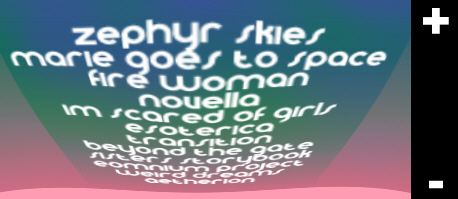
The games
Even though that’s the theme we’re working with, making a surreal game is not everything. We want good games, and there are other things to take into consideration, right? Here’s my impressions on all of them entries in the order that I played.
--SPOILER WARNING—
--I MEAN IT, IF YOU HAVEN’T PLAYED THE GAMES BUT PLAN TO, MAYBE YOU SHOULDN’T READ AHEAD--
WEIRD DREAMS
This game is basically a story of an ordinary girl who dreams herself as a powerful heroine, and her friends as powerful foes. It’s much like an imaginary game a kid would play with her friends: “I’m the hero, I’ll defeat you!”. That said, this game’s story and dialogs are indeed somewhat childish, which is not necessarily a bad thing. There’s really nothing surreal about this game other than “I’m dreaming”. I’m also not sure whether this game is supposed to be set on modern times or in a fantasy setting.
Presentation is very classical on the use of RTP for images and sounds. Mapping is ok. I wasn’t very fond of the magic sound used for the phone ringing though.
All the challenge in this game consists of battling, leveling up and grinding. Battles are not easy. I died on my first combat. When I got to the first boss, I thought I was trapped, because there’s no MP recovery and no healing other than magical. It took me a while to realize I could track back and sleep to recover. That’s when I noticed I had to grind a lot in order not to die. This game also has a very strange experience curve, as you’ll gain many levels in your first battle.
Overall I think this game lacked a little “sumthin-sumthin” to make it fun and interesting.
MARIE GOES TO SPACE
This is a very short game that can be played through in under a minute. There isn’t much point in trying to explain the game mechanics or the story (but they exist). As Julev, the guy who made this game, said: “Let it sink in and let the emotions go through you!”. He also said the game is a reflection. I didn’t reflect upon anything, but I did feel something. There’s something strange and intriguing, but also soothing about destroying a city with my barehands and then flying to space to feel better. Yes, I like this game. My highest score is 276.
FIRE WOMAN
This is definitely a strange game. I really have no idea what’s going on, but I guess it’s ok. Considering the name of the game, you play as a woman who enters the computer world and after you reach level 2 you get on fire. You cast fire skills. There’s a bit of walking, and not knowing what to do. There’s also a lot of repetitive long battles, which I wasn’t crazy about. The graphics are strange and inconsistent, but I appreciate the custom. Apparently there’s a bug in the game that makes you loop and prevents you from reaching the ending. I never got to finish it.
I didn’t get any of this game.
TRANSITION
This game also uses dreams as an explanation for all the strangeness. The entire game is a dream, and at the end, there’s an explanation of all the symbolism used in the game. It’s quite interesting. It’s about being in a burning house, and trying to wake up through dream signals. I like it.
The challenge of this game consists of a flame dodging minigame. You are surrounded by flames, and some of the flames glow before charging you. If any of them touches you, it’s gameover. It’s very unlikely that you will finish this game without dying a few times, and it can be very frustrating. But once you try a few times the movement pattern of the flames gets predictable, so you’ll eventually finish it. Frustrating, but ultimately fun.
The graphics of Transition are very nice. Pretty tilesets, great mapping, lots of overlays and color effects. I have to say diaeitsch went a bit crazy with the overlays. Some (if not most) maps are hard to see because everything is too clouded. The soundtrack of the game was a little tacky.
BEYOND THE GATE
I loved this game. It’s beautiful, clever, well-executed. It’s about a girl who dies, but before facing the passage she has to deal with some difficult elements of her former life. She walks through places that are exaggerations of environments that were relevant in her life, and she watches flashbacks of her own story. The symbolism is very explicit and intelligent. And it brings some actual nice reflections on death. Very well done.
Graphics, mapping, music and sound are great. Presentation is definitely one of the strong points of this game.
Battles in this game are very interesting. They’re mostly pretty easy, but they’re not just fillers. You’ll have to go back to healing spots sometimes. Enemies are fragments of your own personality, and they’ll die in a few hits. I just loved the names of enemy skills. “Commitment Issues” and “Overprotection” are some of them. Genious. And they add a nice flavor to the overall atmosphere of the game. It hasn’t escaped my attention that there’s some sort of (not intentional) symbolism in the battles themselves: as you face fragments of your own personality, you get stronger and more prepared to fight them (which basically means – level up). This is a game that makes good use of all design tools to promote a solid and emotional experience.
EOMNIUM PROJECT
Eomnium Project is the story of a girl having flashbacks about some difficult parts of her life. Unlike Beyond the Gate and I’m Scared of Girls, she’s not dead (I think!). Sadly, I wasn’t able to finish this game. I encountered many bugs, and some of them stopped me from advancing.
This game has a lot of walking, and that’s its biggest flaw. Everything happens in a huge mansion full of doors. The mansion is basically a big empty map. Only one door is opened at a time, but the game never tells you which. You have to try all doors to find out which one will lead you to then next story event. After you watch that event, another door opens, and that’s usually the one farthest from where you are. So walk walk walk. Plus slow walking and big empty maps equals not good. I wasn’t a fan of the soundtrack either... didn’t fit the mood of the game too well.
The actual challenge of the game comes from mazes in which you have to dodge one-hit-kill enemies. They move slowly and in predictable patterns, so it’s not that hard. But they’re inside a maze full of switches that open gates all the way across the map (more walking). Plus time limit, plus not being able to save immediately before the maze equals not good.
I really can’t say much about the story itself, since I only got to watch fragments, but apparently it is the main focus of the game. All other problems are forgivable considering this is (I believe) a beginner’s effort.
NOVELLA
I’ll admit, I have a gripe with this game. And the reason is that it’s conceptually too similar to The Mirror Lied, a game I didn’t like for reasons explained here. My problem with it is: it’s impossible to understand. It’s full of symbolism, but it probably only makes sense in the mind of the person who made it. I mean, of course you can make your own interpretations. But they’ll be wrong. It’s like trying to interpret someone’s dream. It’s just not possible. “Last night I dreamt I was riding a red horse and he said he was my father”. Does it mean anything? Yes, within the symbolic realm of the person who dreamt it. To other people? No. They may interpret, they may project, but they’ll be making it their own dream.
That being said, I didn’t get much from Novella. I know it’s about relationships, about dealing with difficulties in relationships, and about separation. That vibe is strong in the game, and even though it’s never directly addressed, it’s there, and I’ll give the game its merits for that. I mean, it’s not a bad game. It’s a good game. And people who like the idontgetitness (like The Mirror Lied fans) will find this to be a great game.
The presentation of Novella is wonderful. Awesome use of Theodore’s, great mapping, nice lighting effects, beautiful soundtrack, well-made custom graphics and edits, they all work really well in creating the game’s atmosphere. The music in the game deserves special attention. Novella is very musical, not only because of its amazing soundtrack, but because of its piano-playing minigame. The minigame itself plays much like a traditional switch minigame, and events in the game give you clues to the right notes. I have to say, the OCEAN thing was way too obscure. I would never have figured it out without checking spoilers. The one I had to learn by listening was easy enough. And the last one required some guessing. But the really cool thing about this minigame is that you can freely play the piano, and it plays nicely.
Knowing that I wasn’t the only one who had trouble finding out the solution to the minigames, and considering what I said before regarding difficulties in interpreting this game, I think Newblack plainly overestimated his players a bit.
I’M SCARED OF GIRLS
I’ve already written a review of this game.
This game surprised me, because it was great, it was unique, and I didn’t expect this type of game in the contest. Moga is not a regular in RMN, and that’s probably why it was surprising.
I’m scared of girls is an exploration game that pretends to be a roguelike. But battles are so simple, bad and verging on pointless that they shouldn’t characterize this game in any way.
The strong points of this game are 1) its presentation: amazing soundtrack, very strange and fascinating tilesets and maps; and 2) the characterization of the main character. Lamb is a guy who likes to dress as a girl. He’s just died. The whole adventure of I’m scared of girls is Lamb’s journey to final passage. While at it, he has flashbacks of his former life in the form of short textual presentations. These short bits of texts are the best thing in this game. Though it has very little impact on the rest of the game, Lamb is incredibly well-characterized. Also, I found the pace of the game to be very friendly, I enjoyed the exploration process. All I can say is this is a game I found myself wanting to play more, and thinking about it before bedtime. Just read my review for further comments.
ESOTERICA
Esoterica is about a former police officer who loses some friends/teammates on an accident, and goes bananas. He’s institutionalized in a crazy people’s place, losing touch with reality. Apart from short scenes that happen in his room with his doctor and his sister, most of the game happens inside his mind. He's dreaming about this alternative world where everyone is alive. What’s weird is that these characters in his dream world gain some sort of existential independence, and they start trying to control the thoughts in the main character’s mind. Crazy stuff.
I think the concept of this game is quite brilliant, and very well written and developed. I really really liked this game. But as a game, it had many flaws. Starting by its presentation. The graphical elements of this game are really messy. There’s no consistency on graphic usage, on faceset selection, the tilesets and charsets clash, and the mapping is fairly ugly. The music selection is quite bad too... sometimes I found myself wanting a cutscene to end faster just so I could stop listening to some horrible tune. Lots of small bugs and passability issues too. Lots of them.
The shooting minigame was actually fun. Dying in one hit sucks, but saving anywhere soften the frustration. Though it was fun, it’s kinda weird as a custom system. The enemy’s gun target follows you on a slow speed and it chases you like a creature in a very unrealistic way if you think it’s a target. It doesn’t walk through walls? Also, in theory you have to be lined up with the enemy to shoot them, but sometimes I hit enemies that were not really lined up with me, so I have no idea how the range detection system worked. But that’s ok, especially because you can skipp all the shooting parts (but I didn’t).
One thing that’s cool about this game and Transition is that, in the end, all the weirdness and symbolism is explained by the author. It’s cool, but at the same time it dumbens the player a bit cause you avoid him from thinking on his own. Anyways, what scared me the most is that the author presents the whole explanation to what happens as if it’s a believable theory. As if parts of someone’s imagination can actually become independent beings and control that person’s mind. I’m worried about sbester.
AETHERION
I was plesantly surprised about this game too. It’s just too good and professional for something I would expect from a contest. Well, not really surprising considering the elite team behind it. Aetherion is a short game, but very polished, good-looking, well-designed, balanced and nicely paced one. Graphics are a mixture of VX RTP and some custom stuff. Music tunes are nice, not sure where they came from. There are lots of custom systems, and they seem completely bug-free and functional.
So, now that I’ve already said this game is so great, let’s talk about things I didn’t like. First and foremost, characters. Characters are well-written and well characterized. But I found them way too stereotypical for my taste, verging on childish. They were predictable and exaggerated. And they were all arrogant, which probably has to do with whoever wrote them not being able to separate him/herself from the characters enough. I guess it helps on characterization, but I got no remote sense of depth from any of them. It didn’t really detract from the game, but it sure didn’t help. The story was ok, it was interesting and had a good rythm, but too short... which is understandable for a game made in a short time. Finally, I was mildly disappointed by how poorly the theme was developed in Aetherion. Aetherion is a strange world, and it’s characterized by slightly nonsensical mapping and creatures adopting strange shapes. But that’s all. No real surrealism there.
What I did love about the game was its battle system. Possibly one of the best battle systems I’ve ever played. There are two types of skills, attack and support. Each type has 3 levels of skills. You have to equip skills in each slot before going to battle. You learn new skills by leveling up. When you use one skill, you increase a power bar that allows you to use a skill of the same type in the next level (e.g. if you use a level 1 attack skill, you can use a level 2 attack skill the next turn). Level 3 skills are super powerful, but they reset your power bar. Using a skill of a different type resets that power bar. There are two ATBs: one that charges up for each character’s turn, and one that charges after you select an action, before he uses it. That’s it. Simple enough, but efficient, addictive, and it leaves much room for strategy. And this game demands you to be strategical at some points, especially in the final boss, who’s really hard. My only complaint about this system is that it’s too fast. It’s hard being strategical when you have to think that fast.
ZEPHYR SKIES
Speaking of surprises...
When you look at this Zephyr Skies gameprofile, immediate impression: another typical jRPG full of typical stuff. Not my favorite type of gain. Still, it looked pretty well-made, but looking at the description and the screenshots I was curious on how this game would develop the surreal aspect.
Game starts with some cutscene, and then there’s a bug and it resets. I thought a real bug, I reported it and abandoned the game. But some people on #rpgmaker.net told me to keep playing. “What?”, I thought. Then, comes out that this game is nothing like I imagined. Play it and see.
I think this game is just brilliant. The moment of surprise :“this is NOT what I thought it was” is cool enough to give the game all its merits. The way it mixes RPG Maker design glitches and typical designs with windows error messages and stuff... just amazing.
My only complaint is that the wild ride cools down after you start repeating the screenshot tetris. It was a fun idea, but it loses its charm after the first one. And there are like... 10 of them. They do get boring, they kill the pacing.
I also loved how the concept of the game was extended to the gameprofile. There’s a lot of information to convice you that this is a very typical RPG Maker game. This convincing strengthens the final effect.
Zephyr Skies is definitly the most surreal entry in the contest.
SISTER’S STORYBOOK
A young boy tries to play a prank on his sister, but finds himself trapped in her sketchbook. Now he has to play a short adventure throughout places made out of her imagination. Neat concept, but still too solid to be considered surreal. That’s fine.
The game consists of a series of puzzles and battles. There’s a good degree of challenge here... not too easy, not too hard. I’ll admit I had to cheat on the last riddle (Google), but the answer was stupidly obvious.
The atmosphere in this game was well developed. Mapping was nice, there was some neat animations, and the music was fitting. I also enjoyed the naive yet authentic concept of the game on how a little boy changes his view on his sister, from bratty pranked sister to beloved sister by exploring her intimate sketch world. There are a few personifications of the sister herself on her storybook with different personalities, as her feelings towards the main character are also ambiguous.
One word to define this game: cute!
And the winner is...
There are two other judges, so it’s not for me to say. If you’re reading this article after the final result was announced, you can find it out here. But as cliche as it may sound, I think we’re all winners (yay!). I’ve never seen an RMN event with so many entries, and what’s best is that a few of them are good games on their own: not just good entries, or good games considering they’re amateur games made within a time limit... just good games. I think it was also a good opportunity for developers to think outside their box in terms of game design (that could have been the contest’s theme), and a good exercise in exploring alternative game concepts.
Congratulations everyone!
The 2011 RMN Summer Games have been unusual in many ways. First, it had one of the longest (if not the longest) development period of all RMN events (one month). Second, it had a very challenging and restrictive theme: Surrealism, which is more than a synonym of “weird”, but an actual artistic style. Third, a very unexpected group of judges, none of which known for their orthodox tastes in games: StarSkipping, the guy who made strange games like Suicide Club 3 and who’s written some very picky reviews; Max McGee, one of the most prolific RMN members with a huge talent for receiving polemic reviews to his games; and myself, someone who’s got the (undeserved) fame of making games that a parent wouldn’t let his children play.
But sometimes change is good, and this is definitely one of those times. We’ve got twelve very solid entries, all of which from people and teams who’ve stepped up to the challenge of creating good surreal games within a time limit. Overall, I’m quite pleased with these games, and I enjoyed playing (almost) all of them.
Let’s start by talking about the theme. I’m no art specialist, but I do know a bit about cultural and psychological theories that inspired this artistic movement, so I’ll take some freedom in discussing this. Surrealism. What is it? Our initial response should be “strange”, “weird”, which is not far from the truth, but it’s not the whole story. Our basic definition (as described in the gamepage) is:
Surrealism: movement that attempts to express the workings of the subconscious and is characterized by fantastic imagery and incongruous juxtaposition of subject matter.
Going a bit further:
“Surrealism was an offshoot of Dadaism, which posited that traditional art should be replaced with anything "anti-art" and triumphed the ridiculous, the absurd, and a basic disregard for form. Andre Breton was the initial proponent of surrealism in literature and the visual arts. Much of his emphasis was on accessing the unconscious, as viewed by Sigmund Freud.” (Wisegeek)
Definitions from the original Surrealist Manifesto, by Andre Breton:
“Dictionary: Surrealism, n. Pure psychic automatism, by which one proposes to express, either verbally, in writing, or by any other manner, the real functioning of thought. Dictation of thought in the absence of all control exercised by reason, outside of all aesthetic and moral preoccupation.
Encyclopedia: Surrealism. Philosophy. Surrealism is based on the belief in the superior reality of certain forms of previously neglected associations, in the omnipotence of dream, in the disinterested play of thought. It tends to ruin once and for all other psychic mechanisms and to substitute itself for them in solving all the principal problems of life.”
Surrealism is a reactionary movement. It opposes to realism (attemtp to accurately reflect reality as faithfully as possible) and rationalism (logical reason as the source of truth). It’s a “shut up, I don’t have to follow any rules” form of art. Surrealism is defined as a denial of a given set of rules and standards.
As an artistic movement that started in the 1920s, modern surrealism has changed since then, as much of our artistic and visual culture has. Not only the contemporary world would appear surreal to the eyes of people almost a century ago, but modern media and virtual realities have trained our eyes to accept as real things that otherwise would be considered surreal.

This could very much be considered a surreal painting a bunch of decades ago, but it is an image not unexpected or surprising by someone who turns on his TV or goes to the movie today and watches something that can hardly be considered “weird”, or “original”. One could say that “the surreal has become real”. There’s a relative standard, a cultural point of view from which we can say if a given form is surreal or not. Once the surreal starts setting its own standards, rules and boundaries, it is not surreal anymore.
Those familiar with the worlds of video games have had an even more intense experience in adapting to the surreal. Video games have never been realistic or rational in the first place. Maybe that’s partially why they tend to be so fascinating. Characters in video games are deformed, they can jump incredible heights, change appearance instantly, collect infinite coins with no pocket to hold them in, get significantly stronger from one second to the other, die and come back. I mean, come on... what’s more surreal than Mario? The guy defeats enemies by jumping over their heads, goes from one place to another by traveling in giant interdimensional pipes, and he doubles his size by eating mushrooms. Trippy stuff.

But games set trends, they set standards. New games will follow rules that were set by old games. They won’t come off as unexpected, surprising, or incongruous. They’re not surreal anymore. As distant from reality as they may seem, games tend to follow very strict design rules that were created by a culture of gamers. As amateur game designers, we know those rules, and we have our own. As members of a game design community, we extensively discuss those rules among our peers. What makes a good game? Balancing, a good story, visual consistency, good pacing, nice graphics, etc. etc. We have our rules, our own sort of rationalism. Not only that, games (especially commercial ones) are setting realism as a new golden standard. Cooler games are as realistic as possible. Not only graphically resembling real life, but they have realistic time-passing systems, real-person voices and faces, they force you to eat, sleep... they’re becoming simulations of real-life activities.

Still can’t mistake this for a real person, but we’re getting close.
These rules get so strict, that it’s only natural to expect some sort of reactionary movement in game-design, our own breed of “anti-art”. Thanks to indie game design communities, which are not as tied by commercial standards, we have our own sort of Surrealism in games. These are the games that say “to hell with three-tile mapping, to hell with elaborate custom systems, to hell with standard story structures”. Feels good to be freed from the chains. That’s why games such as Space Funeral get so much attention, even outside the indie community. When something actually breaks the molds, stomps over realism and utterly ignores rationalism, it provokes that sense of awe, surprise and fascination which is characteristic of Surreal art.

I’m not you.
Space Funeral is not a particularly good game in many ways, but it stands out because it achieved this simple goal, which is breaking free from norms. By definition, it sets its own norm, so it’s pretty clear a Space Funeral clone wouldn’t be as interesting, and it would lose its merits in surrealism. Yes, as you may have noticed, making a surreal game is no easy task.
The Unconscious
One thing about Surrealism is not following any rules or standards. Another thing about it is letting our work of art be guided by the works of our unconscious. Let me share a word about the unconscious, as defined by our friend Sigmund Freud. It is operated by something called “the pleasure principle”, an instance that does not follow any of the rules that define reality: constancy, chronology, coherence, etc. To the pleasure principle, two people can be the same person, you can be at one place and another at the same time, etc. If you ever had a dream, you know what I’m talking about. The pleasure principle is guided by, as you may have guessed, pleasure. It represents the omnipotence of desire. “I want it all, and I want it now”, it goes. Luckily there’s a counterpart to the pleasure principle which is the reality principle, mediated by the ego, that allows us to live in the real world. It forces us to conform to reality, and oppresses the pleasure principle. Without it, we just wouldn’t survive.
That’s why people tend to associate Surrealism with dreams: they follow the same principles (which are none). But the unconscious does not operate solely when we’re sleeping. It is omnipresent, it is in us, behind us, even when (and especially when) we’re not aware. It’s in our tongue slips, in our unthought behavior, our artistic expressions, our persistent habits, in our secret tastes. Sadly, the ego does a fairly good job in hiding and rationalizing it.
There are tools and techniques to promote some sort of access to the unconscious, though. The main of which is free association: It is a technique used mostly in psychoanalysis sessions, but its principles can be extended to any artistic performance. It basically means: do/say whatever comes to mind, don’t think it, don’t stop.
“In free association, psychoanalytic patients are invited to relate whatever comes into their minds during the analytic session, and not to censor their thoughts. (...)When used in this spirit, free association is a technique in which neither therapist nor patient knows in advance exactly where the conversation will lead, but it tends to lead to material that matters very much to the patient. 'In spite of the seeming confusion and lack of connection...meanings and connections begin to appear out of the disordered skein of thoughts...some central themes'.” (Wikipedia).
Adding to that, there’s also Interpretation, which is an indirect access to the unconscious by the sorts of manifestations I said above: dreams, faulty acts, art and symbolism.
Surrealism is pleasure, but the ego doesn’t like it
As a manifestation of our pleasure principle, it is understandable that surrealism provokes such good feelings in us. But the same mechanisms that permit us to live in the real world forbids us to live by pleasure to some degree. That’s why we’re resistant to surrealism. That’s why we feel disturbed and uncomforted when in the presence of it. And that’s why many of the games in this contest have adopted an artifice that I’ll call the WTF artifice, which I shall define as an in-game denial of its own surrealism. In other words, the player is thrown into a weird world, but story mechanisms (usually initial speeches from the main character) soften the weirding effects of that world. This is what I’m talking about:

Examples of the WTF artifice
If you want to understand this mechanism, try to think of games in which they don’t happen, like Space Funeral, Yume Nikki, or this contest’s own Fire Woman and Novella. As disturbed and intrigued as the player may feel, the main character which he controls feels pretty adapted to that environment, which only increases the surreal effect. If the main character holds the player’s hands and say “I understand how you feel, I’m also freaked out”, the impact is diminished. Which is not a good thing.
It’s all about us
Having given some sort of very crude and pretentious recipe for Surrealism, I guess I’m now in a better position of judging whether the games submitted to this contest are surreal or not. There’s one question left to be answered though: following the theme of surrealism means:
1) Creating a game ABOUT surrealism?
2) Creating a surreal game (i.e. defying game design conventions in considering the game as a surreal piece in itself)?
If I go with number 2, there are not many actual surreal games in this contest. I’ll try and make a visual representation of all the entries, ranked by degree of surrealism. Let’s see if you agree with me.

The games
Even though that’s the theme we’re working with, making a surreal game is not everything. We want good games, and there are other things to take into consideration, right? Here’s my impressions on all of them entries in the order that I played.
--SPOILER WARNING—
--I MEAN IT, IF YOU HAVEN’T PLAYED THE GAMES BUT PLAN TO, MAYBE YOU SHOULDN’T READ AHEAD--
WEIRD DREAMS
This game is basically a story of an ordinary girl who dreams herself as a powerful heroine, and her friends as powerful foes. It’s much like an imaginary game a kid would play with her friends: “I’m the hero, I’ll defeat you!”. That said, this game’s story and dialogs are indeed somewhat childish, which is not necessarily a bad thing. There’s really nothing surreal about this game other than “I’m dreaming”. I’m also not sure whether this game is supposed to be set on modern times or in a fantasy setting.
Presentation is very classical on the use of RTP for images and sounds. Mapping is ok. I wasn’t very fond of the magic sound used for the phone ringing though.
All the challenge in this game consists of battling, leveling up and grinding. Battles are not easy. I died on my first combat. When I got to the first boss, I thought I was trapped, because there’s no MP recovery and no healing other than magical. It took me a while to realize I could track back and sleep to recover. That’s when I noticed I had to grind a lot in order not to die. This game also has a very strange experience curve, as you’ll gain many levels in your first battle.
Overall I think this game lacked a little “sumthin-sumthin” to make it fun and interesting.
MARIE GOES TO SPACE
This is a very short game that can be played through in under a minute. There isn’t much point in trying to explain the game mechanics or the story (but they exist). As Julev, the guy who made this game, said: “Let it sink in and let the emotions go through you!”. He also said the game is a reflection. I didn’t reflect upon anything, but I did feel something. There’s something strange and intriguing, but also soothing about destroying a city with my barehands and then flying to space to feel better. Yes, I like this game. My highest score is 276.
FIRE WOMAN
This is definitely a strange game. I really have no idea what’s going on, but I guess it’s ok. Considering the name of the game, you play as a woman who enters the computer world and after you reach level 2 you get on fire. You cast fire skills. There’s a bit of walking, and not knowing what to do. There’s also a lot of repetitive long battles, which I wasn’t crazy about. The graphics are strange and inconsistent, but I appreciate the custom. Apparently there’s a bug in the game that makes you loop and prevents you from reaching the ending. I never got to finish it.
I didn’t get any of this game.
TRANSITION
This game also uses dreams as an explanation for all the strangeness. The entire game is a dream, and at the end, there’s an explanation of all the symbolism used in the game. It’s quite interesting. It’s about being in a burning house, and trying to wake up through dream signals. I like it.
The challenge of this game consists of a flame dodging minigame. You are surrounded by flames, and some of the flames glow before charging you. If any of them touches you, it’s gameover. It’s very unlikely that you will finish this game without dying a few times, and it can be very frustrating. But once you try a few times the movement pattern of the flames gets predictable, so you’ll eventually finish it. Frustrating, but ultimately fun.
The graphics of Transition are very nice. Pretty tilesets, great mapping, lots of overlays and color effects. I have to say diaeitsch went a bit crazy with the overlays. Some (if not most) maps are hard to see because everything is too clouded. The soundtrack of the game was a little tacky.
BEYOND THE GATE
I loved this game. It’s beautiful, clever, well-executed. It’s about a girl who dies, but before facing the passage she has to deal with some difficult elements of her former life. She walks through places that are exaggerations of environments that were relevant in her life, and she watches flashbacks of her own story. The symbolism is very explicit and intelligent. And it brings some actual nice reflections on death. Very well done.
Graphics, mapping, music and sound are great. Presentation is definitely one of the strong points of this game.
Battles in this game are very interesting. They’re mostly pretty easy, but they’re not just fillers. You’ll have to go back to healing spots sometimes. Enemies are fragments of your own personality, and they’ll die in a few hits. I just loved the names of enemy skills. “Commitment Issues” and “Overprotection” are some of them. Genious. And they add a nice flavor to the overall atmosphere of the game. It hasn’t escaped my attention that there’s some sort of (not intentional) symbolism in the battles themselves: as you face fragments of your own personality, you get stronger and more prepared to fight them (which basically means – level up). This is a game that makes good use of all design tools to promote a solid and emotional experience.
EOMNIUM PROJECT
Eomnium Project is the story of a girl having flashbacks about some difficult parts of her life. Unlike Beyond the Gate and I’m Scared of Girls, she’s not dead (I think!). Sadly, I wasn’t able to finish this game. I encountered many bugs, and some of them stopped me from advancing.
This game has a lot of walking, and that’s its biggest flaw. Everything happens in a huge mansion full of doors. The mansion is basically a big empty map. Only one door is opened at a time, but the game never tells you which. You have to try all doors to find out which one will lead you to then next story event. After you watch that event, another door opens, and that’s usually the one farthest from where you are. So walk walk walk. Plus slow walking and big empty maps equals not good. I wasn’t a fan of the soundtrack either... didn’t fit the mood of the game too well.
The actual challenge of the game comes from mazes in which you have to dodge one-hit-kill enemies. They move slowly and in predictable patterns, so it’s not that hard. But they’re inside a maze full of switches that open gates all the way across the map (more walking). Plus time limit, plus not being able to save immediately before the maze equals not good.
I really can’t say much about the story itself, since I only got to watch fragments, but apparently it is the main focus of the game. All other problems are forgivable considering this is (I believe) a beginner’s effort.
NOVELLA
I’ll admit, I have a gripe with this game. And the reason is that it’s conceptually too similar to The Mirror Lied, a game I didn’t like for reasons explained here. My problem with it is: it’s impossible to understand. It’s full of symbolism, but it probably only makes sense in the mind of the person who made it. I mean, of course you can make your own interpretations. But they’ll be wrong. It’s like trying to interpret someone’s dream. It’s just not possible. “Last night I dreamt I was riding a red horse and he said he was my father”. Does it mean anything? Yes, within the symbolic realm of the person who dreamt it. To other people? No. They may interpret, they may project, but they’ll be making it their own dream.
That being said, I didn’t get much from Novella. I know it’s about relationships, about dealing with difficulties in relationships, and about separation. That vibe is strong in the game, and even though it’s never directly addressed, it’s there, and I’ll give the game its merits for that. I mean, it’s not a bad game. It’s a good game. And people who like the idontgetitness (like The Mirror Lied fans) will find this to be a great game.
The presentation of Novella is wonderful. Awesome use of Theodore’s, great mapping, nice lighting effects, beautiful soundtrack, well-made custom graphics and edits, they all work really well in creating the game’s atmosphere. The music in the game deserves special attention. Novella is very musical, not only because of its amazing soundtrack, but because of its piano-playing minigame. The minigame itself plays much like a traditional switch minigame, and events in the game give you clues to the right notes. I have to say, the OCEAN thing was way too obscure. I would never have figured it out without checking spoilers. The one I had to learn by listening was easy enough. And the last one required some guessing. But the really cool thing about this minigame is that you can freely play the piano, and it plays nicely.
Knowing that I wasn’t the only one who had trouble finding out the solution to the minigames, and considering what I said before regarding difficulties in interpreting this game, I think Newblack plainly overestimated his players a bit.
I’M SCARED OF GIRLS
I’ve already written a review of this game.
This game surprised me, because it was great, it was unique, and I didn’t expect this type of game in the contest. Moga is not a regular in RMN, and that’s probably why it was surprising.
I’m scared of girls is an exploration game that pretends to be a roguelike. But battles are so simple, bad and verging on pointless that they shouldn’t characterize this game in any way.
The strong points of this game are 1) its presentation: amazing soundtrack, very strange and fascinating tilesets and maps; and 2) the characterization of the main character. Lamb is a guy who likes to dress as a girl. He’s just died. The whole adventure of I’m scared of girls is Lamb’s journey to final passage. While at it, he has flashbacks of his former life in the form of short textual presentations. These short bits of texts are the best thing in this game. Though it has very little impact on the rest of the game, Lamb is incredibly well-characterized. Also, I found the pace of the game to be very friendly, I enjoyed the exploration process. All I can say is this is a game I found myself wanting to play more, and thinking about it before bedtime. Just read my review for further comments.
ESOTERICA
Esoterica is about a former police officer who loses some friends/teammates on an accident, and goes bananas. He’s institutionalized in a crazy people’s place, losing touch with reality. Apart from short scenes that happen in his room with his doctor and his sister, most of the game happens inside his mind. He's dreaming about this alternative world where everyone is alive. What’s weird is that these characters in his dream world gain some sort of existential independence, and they start trying to control the thoughts in the main character’s mind. Crazy stuff.
I think the concept of this game is quite brilliant, and very well written and developed. I really really liked this game. But as a game, it had many flaws. Starting by its presentation. The graphical elements of this game are really messy. There’s no consistency on graphic usage, on faceset selection, the tilesets and charsets clash, and the mapping is fairly ugly. The music selection is quite bad too... sometimes I found myself wanting a cutscene to end faster just so I could stop listening to some horrible tune. Lots of small bugs and passability issues too. Lots of them.
The shooting minigame was actually fun. Dying in one hit sucks, but saving anywhere soften the frustration. Though it was fun, it’s kinda weird as a custom system. The enemy’s gun target follows you on a slow speed and it chases you like a creature in a very unrealistic way if you think it’s a target. It doesn’t walk through walls? Also, in theory you have to be lined up with the enemy to shoot them, but sometimes I hit enemies that were not really lined up with me, so I have no idea how the range detection system worked. But that’s ok, especially because you can skipp all the shooting parts (but I didn’t).
One thing that’s cool about this game and Transition is that, in the end, all the weirdness and symbolism is explained by the author. It’s cool, but at the same time it dumbens the player a bit cause you avoid him from thinking on his own. Anyways, what scared me the most is that the author presents the whole explanation to what happens as if it’s a believable theory. As if parts of someone’s imagination can actually become independent beings and control that person’s mind. I’m worried about sbester.
AETHERION
I was plesantly surprised about this game too. It’s just too good and professional for something I would expect from a contest. Well, not really surprising considering the elite team behind it. Aetherion is a short game, but very polished, good-looking, well-designed, balanced and nicely paced one. Graphics are a mixture of VX RTP and some custom stuff. Music tunes are nice, not sure where they came from. There are lots of custom systems, and they seem completely bug-free and functional.
So, now that I’ve already said this game is so great, let’s talk about things I didn’t like. First and foremost, characters. Characters are well-written and well characterized. But I found them way too stereotypical for my taste, verging on childish. They were predictable and exaggerated. And they were all arrogant, which probably has to do with whoever wrote them not being able to separate him/herself from the characters enough. I guess it helps on characterization, but I got no remote sense of depth from any of them. It didn’t really detract from the game, but it sure didn’t help. The story was ok, it was interesting and had a good rythm, but too short... which is understandable for a game made in a short time. Finally, I was mildly disappointed by how poorly the theme was developed in Aetherion. Aetherion is a strange world, and it’s characterized by slightly nonsensical mapping and creatures adopting strange shapes. But that’s all. No real surrealism there.
What I did love about the game was its battle system. Possibly one of the best battle systems I’ve ever played. There are two types of skills, attack and support. Each type has 3 levels of skills. You have to equip skills in each slot before going to battle. You learn new skills by leveling up. When you use one skill, you increase a power bar that allows you to use a skill of the same type in the next level (e.g. if you use a level 1 attack skill, you can use a level 2 attack skill the next turn). Level 3 skills are super powerful, but they reset your power bar. Using a skill of a different type resets that power bar. There are two ATBs: one that charges up for each character’s turn, and one that charges after you select an action, before he uses it. That’s it. Simple enough, but efficient, addictive, and it leaves much room for strategy. And this game demands you to be strategical at some points, especially in the final boss, who’s really hard. My only complaint about this system is that it’s too fast. It’s hard being strategical when you have to think that fast.
ZEPHYR SKIES
Speaking of surprises...
When you look at this Zephyr Skies gameprofile, immediate impression: another typical jRPG full of typical stuff. Not my favorite type of gain. Still, it looked pretty well-made, but looking at the description and the screenshots I was curious on how this game would develop the surreal aspect.
Game starts with some cutscene, and then there’s a bug and it resets. I thought a real bug, I reported it and abandoned the game. But some people on #rpgmaker.net told me to keep playing. “What?”, I thought. Then, comes out that this game is nothing like I imagined. Play it and see.
I think this game is just brilliant. The moment of surprise :“this is NOT what I thought it was” is cool enough to give the game all its merits. The way it mixes RPG Maker design glitches and typical designs with windows error messages and stuff... just amazing.
My only complaint is that the wild ride cools down after you start repeating the screenshot tetris. It was a fun idea, but it loses its charm after the first one. And there are like... 10 of them. They do get boring, they kill the pacing.
I also loved how the concept of the game was extended to the gameprofile. There’s a lot of information to convice you that this is a very typical RPG Maker game. This convincing strengthens the final effect.
Zephyr Skies is definitly the most surreal entry in the contest.
SISTER’S STORYBOOK
A young boy tries to play a prank on his sister, but finds himself trapped in her sketchbook. Now he has to play a short adventure throughout places made out of her imagination. Neat concept, but still too solid to be considered surreal. That’s fine.
The game consists of a series of puzzles and battles. There’s a good degree of challenge here... not too easy, not too hard. I’ll admit I had to cheat on the last riddle (Google), but the answer was stupidly obvious.
The atmosphere in this game was well developed. Mapping was nice, there was some neat animations, and the music was fitting. I also enjoyed the naive yet authentic concept of the game on how a little boy changes his view on his sister, from bratty pranked sister to beloved sister by exploring her intimate sketch world. There are a few personifications of the sister herself on her storybook with different personalities, as her feelings towards the main character are also ambiguous.
One word to define this game: cute!
And the winner is...
There are two other judges, so it’s not for me to say. If you’re reading this article after the final result was announced, you can find it out here. But as cliche as it may sound, I think we’re all winners (yay!). I’ve never seen an RMN event with so many entries, and what’s best is that a few of them are good games on their own: not just good entries, or good games considering they’re amateur games made within a time limit... just good games. I think it was also a good opportunity for developers to think outside their box in terms of game design (that could have been the contest’s theme), and a good exercise in exploring alternative game concepts.
Congratulations everyone!
Posts 

Well done, I have, IMO, 2 objections : I found Sisters Storybook" amazingly surrealist, not in the overall story, but in the adventures of the hero , on the contrary, as for Novella, the meaning of which I realized I couln't in fact decipher, however long I took, it (in the best of cases) could be because it actually was not finished. At last, for Esoterica, I really appreciated the music, the fast paced one as the soft one ( for Zephyr's Sky, I regret not having been able to go past the tetris (I suspect some bug at this point), and thus not being able to have an idea of the game in it's whole, just to say).
Edit : omg!!! finally got my answer for ZS.,... well done, I was totally mystified!
Edit : omg!!! finally got my answer for ZS.,... well done, I was totally mystified!
Very detailed article :) along with the WTF artifice, I noticed alot of the developers relied on dreams as a plot device and actually tried to mold surrealism around the narrative. Relying too much on gaming conventions than actually going crazy with thier imagination, but whatever the case I enjoyed playing through all these games and the way you guys took it head on was pretty inspiring to see!
Yeah I can't fault this article much. Pretty much hits the nail on the head as far as I'm concerned (I love the WTF Artifice thing, it's something that I really dislike in games and I think it's responsible for ruining the atmosphere in games all too often). Very nice, lengthy and detailed summary of a long month of game making. Nice job Calunio - We need more stuff like this.
This is an awesome article and it really delves into the heart of the games. I'm really intrigued to play Zephyr Skies now, amongst others. I don't think it was as full of spoilers as you warned though, which is a good thing.
About the Esoterica feedback, I'm glad you liked it (despite its very obvious flaws). I'm actually kind of indifferent to my use of music for it lol. The battles were originally a lot tougher to play, but when people were having difficulties, I pretty much made it so that you can shoot to kill from anywhere (as long as the enemy was somewhere within the character's peripherals). I'll update the download one final time in the next little while to fix up some of the other errors mentioned.
P.S. You should all indeed be very worried about me. You can support my cause for re-establishing sanity by checking out Fragile Hearts (Redux) when it launches next month! Hmmm... shameless plugs DO feel great!
About the Esoterica feedback, I'm glad you liked it (despite its very obvious flaws). I'm actually kind of indifferent to my use of music for it lol. The battles were originally a lot tougher to play, but when people were having difficulties, I pretty much made it so that you can shoot to kill from anywhere (as long as the enemy was somewhere within the character's peripherals). I'll update the download one final time in the next little while to fix up some of the other errors mentioned.
P.S. You should all indeed be very worried about me. You can support my cause for re-establishing sanity by checking out Fragile Hearts (Redux) when it launches next month! Hmmm... shameless plugs DO feel great!
This article was a nice read and got me more curious about the games & made me want to be more involved in the event (too bad it's almost over?) I've only played 3 of the contest games, but I think I'll have to check a few more now.
Congratulations to all the participants however!
Congratulations to all the participants however!
Great article indeed. Now I'm quite curious as to what you would have done with this theme ... Especially in terms of game mechanics and standards breaking.
Not reading this until I have played games and formulated my own opinions, but I am relieved that the creators have SOME feedback to chew on.
Hey, this is pretty nice. The "WTF Artifice" struck home; I realize now that's what's been annoying me and probably why I like Asylum of Pleasure and Pain so much.
A comment about dadaism that a moment's quick research revealed was not fully accurate; nothing controversial, really. : )
Well, I'll admit I'm kinda surprised that no one disagree or said anything about my views on Surrealism.
Considering not even half the people who entered this contest have commented on the feedback I gave in this article, I guess people are really in no rush for the final announcement.
Max, take your time.
Max, take your time.
and what would we have to say?
it is not our job to agree on disagree on the reviews,
what we have to do is wait for the results and accept them...
it is not our job to agree on disagree on the reviews,
what we have to do is wait for the results and accept them...
author=rabitZ
and what would we have to say?
it is not our job to agree on disagree on the reviews,
Of course it is.
And I was also referring to the article's general ideas.
Well, for what is worth then, I personally agree on most of the points made in the article. Didn't thought it was necessary to note it.
I personally don't find it jarring when games pull the WTF artifice, it makes me believe the characters are more like us, and more relatable.
So yeah, I am eager to find out the results of the contest and look forward to them. Hope it's not too long until we find out.
I personally don't find it jarring when games pull the WTF artifice, it makes me believe the characters are more like us, and more relatable.
So yeah, I am eager to find out the results of the contest and look forward to them. Hope it's not too long until we find out.
author=rabitZ
I personally don't find it jarring when games pull the WTF artifice, it makes me believe the characters are more like us, and more relatable.
Ahh, I don't agree with this... If a game's going to try and put you under a unique "atmosphere," it can't ever acknowledge that something's amiss. The weirdest games are the ones where something's clearly wrong but everyone just acknowledges it as normal. Take Asylum of Pleasure and Pain for example. The creator doesn't come out and say "I'm making an insane schizophrenic vortex of a game" but just presents it as normal, and that's how it gets its power.
Basically, I think a lot of surreality is just tampering with the definition of normality, or how normality is defined in-story.















